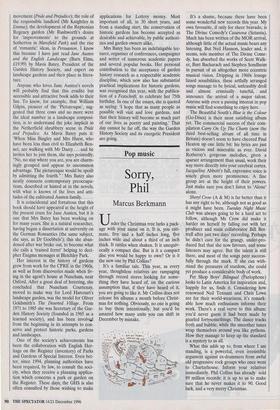Pop music
Sorry, Phil
Marcus Berkmann
Under the Christmas tree lurks a pack- age with your name on it. It is, you esti- mate, five and a half inches long, five inches wide and about a third of an inch thick. It rattles when shaken. It is unequiv- ocally a compact disc. But is it a compact disc you would be happy to own? Or is it the new one by Phil Collins?
It's a familiar tale. This year, as every year, thoughtless relatives are rampaging through record stores looking for some- thing they have heard of, on the curious assumption that, if they have heard of it, you are going to like it. Mr Collins does not release his albums a month before Christ- mas for nothing. Obviously, no one is going to buy them intentionally, but you'd be amazed how many units you can shift in December by mistake. It's a shame, because there have been some wonderful new records this year. My own favourite, if only for sheer bravado, is The Divine Comedy's Casanova (Setanta). Much has been written of the MOR arrival, although little of the actual music bears any listening. But Neil Hannon, leader and, it seems, sole member of The Divine Come- dy, has absorbed the works of Scott Walk- er, Burt Bacharach and Stephen Sondheim in pursuit of an altogether more eccentric musical vision. Dripping in 1960s lounge lizard sensibilities, these artfully arranged songs manage to be lyrical, unfeasibly droll and almost criminally tuneful, and announce the arrival of a major talent. Anyone with even a passing interest in pop music will find something to enjoy here.
The Beautiful South's Blue is the Colour (Go-Discs) is their most satisfying album yet. The commercial success of their com- pilation Carry On Up The Charts (now the third best-selling album of all time in Britain) doesn't seem to have cheered Paul Heaton up one little bit: his lyrics are just as vicious and miserable as ever. David Rotheray's gorgeous melodies, given a sparser arrangement than usual, work their way more directly into your cerebral cortex. Jacqueline Abbott's full, expressive voice is wisely given more prominence. A fine group are at the height of their powers. Just make sure you don't listen to 'Alone' alone.
Sheryl Crow (A & M) is far better than it has any right to be, although not as good as it might have been. Tuesday Night Music Club was always going to be a hard act to follow, although Ms Crow did make it harder on herself by falling out with her producer and main collaborator Bill Bot- trell after just two days' recording. Perhaps he didn't care for the grungy, under-pro- duced feel that she now favours, and some listeners may agree. But the talent is still there, and most of the songs peer success- fully through the murk. If she can with- stand the pressures of stardom, she could yet produce a considerable body of work.
Pet Shop Boys' Bilingual (Parlophone) looks to Latin America for inspiration and, happily for us, finds it. Considering how renowned Neil Tennant and Chris Lowe are for their world-weariness, it's remark- able how much enthusiasm informs their work. There's a real verve to this album: you'd never guess it had been made by gnarled fortysomethings. The dance tracks froth and bubble, while the smoother tunes wrap themselves around you like pythons. How they manage to keep up the standard is a mystery to us all.
What this adds up to, from where I am standing, is a powerful, even irresistible argument against ex-drummers from awful old progressive rock groups who once went to Charterhouse. Inform your relatives immediately. Phil Collins has already sold 89 million records: it is up to us to make sure that he never makes it to 90. Good luck, and a very merry Christmas.


















































































































 Previous page
Previous page